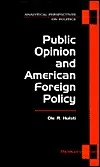Public Opinion and American Foreign Policy
By (author): "Ole R. Holsti"
Publish Date:
January 1st 1997
ISBN0472096192
ISBN139780472096190
AsinPublic Opinion and American Foreign Policy
Original titlePublic Opinion and American Foreign Policy (Analytical Perspectives on Politics)
One of the central issues in democratic theory is the proper role of public opinion in the conduct of international affairs. The capacity of the public to make informed judgments about these complex issues which are often far removed from their experience has been questioned. In addition, the impact of public opinion on foreign policy-making has been debated. In Public Opinion and American Foreign Policy Ole Holsti addresses these crucial issues using extensive data on public attitudes and preferences on international affairs. Holsti concludes that although the American public is not well informed about many aspects of foreign affairs, its opinions are usually stable and reasonable reactions to real world events, are not lacking in structure, and can often have an important impact on foreign policies.Holsti surveys changing perceptions of the effect of public opinion on foreign policy since World War I. According to Holsti, this war transformed the issue of public participation in foreign affairs from a theoretical into a practical one that many postwar leaders had to confront. World War II and its immediate aftermath are equally significant. The Vietnam War stimulated a new wave of theory and research that challenged many aspects of the post-World War II view of public opinion. The author assesses the hypothesis that the bipartisan foreign policy consensus of the post-World War II period has, during the past two decades, given way to sharp partisan cleavages, reinforced by ideological differences. The end of the Cold War has also raised new questions about public opinion and foreign policy.Holsti explores the determinants of public opinion on foreign policy, the impact of gender, generation, education, religion, and race on foreign policy attitudes, and the relationship of the opinions of the general public to the opinions of leaders.This book will be of interest to political scientists, historians, political psychologists, and anyone with an interest in American foreign policy and the domestic factors that may affect its formulation and implementation.Ole Holsti is George V. Allen Professor of International Affairs, Duke University.
